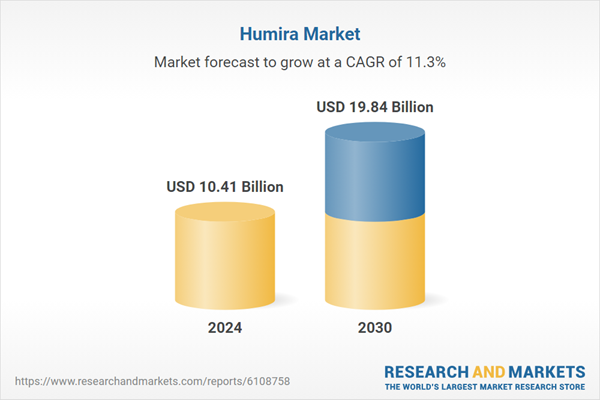Speak directly to the analyst to clarify any post sales queries you may have.
10% Free customizationThis report comes with 10% free customization, enabling you to add data that meets your specific business needs.
With a growing elderly population and improved awareness around early diagnosis and treatment, biologic therapies like Humira (adalimumab) are being prescribed more frequently. Humira’s proven effectiveness in reducing inflammation and improving long-term disease management has made it a preferred treatment across various specialties, including rheumatology, gastroenterology, and dermatology. Additionally, its usage is being extended through clinical trials exploring new indications and combination therapies. Despite the expiration of key patents, the brand continues to maintain a strong market presence, aided by innovations in delivery methods, patient assistance programs, and strategic licensing efforts that help mitigate the impact of biosimilar competition.
Key Market Drivers
Rising Prevalence of Autoimmune and Chronic Inflammatory Diseases
The increasing incidence of autoimmune and chronic inflammatory disorders is a primary factor driving the Global Humira Market. According to the World Health Organization, approximately 18 million people were living with rheumatoid arthritis in 2019, with a 14.1% increase in global age-standardized prevalence since 1990. In the United States alone, psoriasis affects about 3% of the adult population, totaling over 7.5 million individuals.This expanding patient base fuels the demand for biologic treatments like Humira, especially as healthcare providers are beginning therapy earlier in the disease course to prevent long-term complications. Greater public awareness and advocacy have also contributed to earlier diagnosis and intervention, making advanced immunotherapies more integral to treatment strategies. Humira’s long-standing clinical use across multiple therapeutic areas has established it as a trusted option among physicians, reinforcing its continued adoption.
Key Market Challenges
Patent Expirations and Loss of Exclusivity
One of the most significant challenges facing the Global Humira Market is the expiration of its key patents and the resulting loss of market exclusivity. AbbVie’s Humira enjoyed a dominant position due to robust patent protection, but the introduction of biosimilar adalimumab products has begun to erode its market share. These biosimilars offer similar efficacy at lower prices, prompting healthcare systems - particularly in cost-sensitive regions - to encourage their use as a cost-saving measure.As biosimilar availability expands, insurers and pharmacy benefit managers are prioritizing them over the originator drug, increasing pressure on prescribers to switch treatments. This competitive shift is changing pricing dynamics and weakening Humira’s revenue potential in markets where cost containment and accessibility are key concerns.
Key Market Trends
Rising Demand for Real-World Evidence (RWE)
A growing focus on Real-World Evidence (RWE) is shaping the Global Humira Market, as stakeholders seek comprehensive data on how treatments perform outside controlled clinical trials. With the rise of biosimilars and competitive pricing, regulators, payers, and clinicians are relying more on RWE to evaluate long-term outcomes, adherence rates, patient satisfaction, and comparative effectiveness across various populations.RWE provides valuable insights into how therapies function in real-world settings, especially for patients with multiple conditions or inconsistent treatment patterns. These insights are crucial for making informed decisions about therapy options, reimbursement policies, and value-based care initiatives, particularly as the market adapts to increasing biosimilar usage.
Key Market Players
- Alvotech
- Amgen Inc.
- Boehringer Ingelheim Pharmaceuticals, Inc.
- CELLTRION INC.
- Coherus BioSciences, Inc.
- Fresenius Kabi AG
- FUJIFILM KYOWA KIRIN BIOLOGICS Co., Ltd.
- Pfizer Inc.
- Samsung Bioepis Co., Ltd.
- Sandoz Inc.
Report Scope:
In this report, the Global Humira Market has been segmented into the following categories, in addition to the industry trends which have also been detailed below:Humira Market, By Product:
- Branded
- Biosimilar
Humira Market, By Application:
- Rheumatoid Arthritis (RA)
- Psoriatic Arthritis (PsA)
- Crohn’s Disease (CD)
- Ulcerative Colitis (UC)
- Ankylosing Spondylitis
- Others
Humira Market, By Distribution Channel:
- Hospital Pharmacies
- Retail Pharmacies
- Online Pharmacies
Humira Market, By Region:
- North America
- United States
- Canada
- Mexico
- Europe
- France
- United Kingdom
- Italy
- Germany
- Spain
- Asia-Pacific
- China
- India
- Japan
- Australia
- South Korea
- South America
- Brazil
- Argentina
- Colombia
- Middle East & Africa
- South Africa
- Saudi Arabia
- UAE
Competitive Landscape
Company Profiles: Detailed analysis of the major companies present in the Global Humira Market.Available Customizations:
With the given market data, the publisher offers customizations according to a company's specific needs. The following customization options are available for the report.Company Information
- Detailed analysis and profiling of additional market players (up to five).
This product will be delivered within 1-3 business days.
Table of Contents
Companies Mentioned
- Alvotech
- Amgen Inc.
- Boehringer Ingelheim Pharmaceuticals, Inc.
- CELLTRION INC.
- Coherus BioSciences, Inc.
- Fresenius Kabi AG
- FUJIFILM KYOWA KIRIN BIOLOGICS Co., Ltd.
- Pfizer Inc.
- Samsung Bioepis Co., Ltd.
- Sandoz Inc.
Table Information
| Report Attribute | Details |
|---|---|
| No. of Pages | 184 |
| Published | July 2025 |
| Forecast Period | 2024 - 2030 |
| Estimated Market Value ( USD | $ 10.41 Billion |
| Forecasted Market Value ( USD | $ 19.84 Billion |
| Compound Annual Growth Rate | 11.3% |
| Regions Covered | Global |
| No. of Companies Mentioned | 10 |









